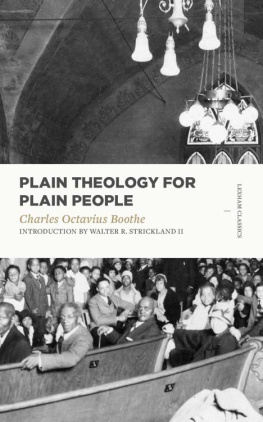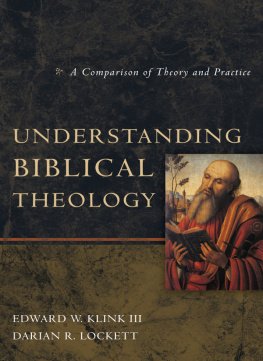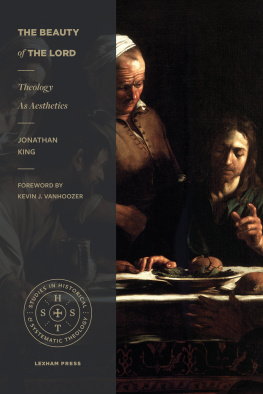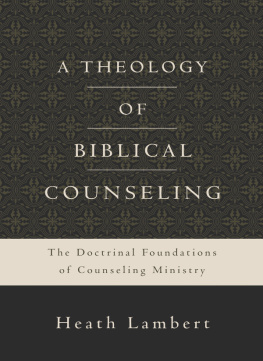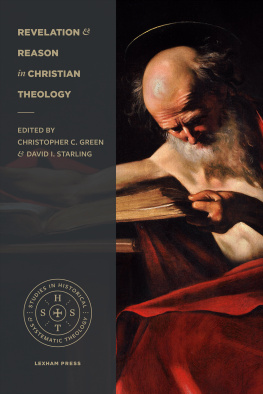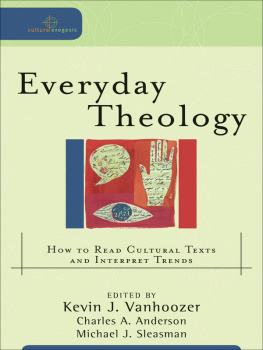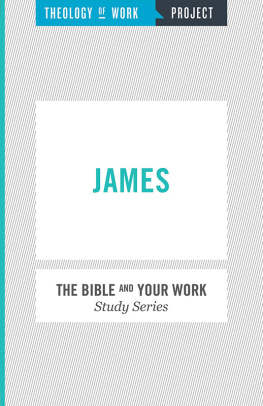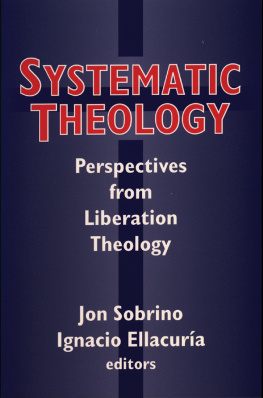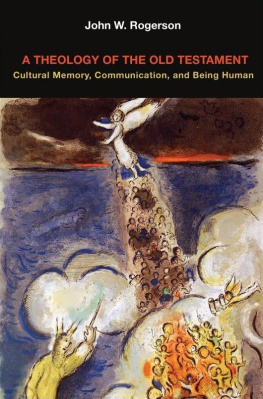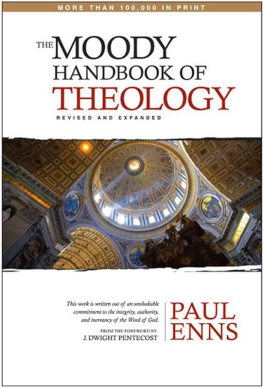Plain Theology for Plain People
Charles Octavius Boothe
Introduction by Walter R. Strickland II

Plain Theology for Plain People
Copyright 2017 Lexham Press
Lexham Press, 1313 Commercial St., Bellingham, WA 98225
LexhamPress.com
All rights reserved. You may use brief quotations from this resource in presentations, articles, and books. For all other uses, please write Lexham Press for permission. Email us at .
Originally published by the American Baptist Publication Society, Philadelphia, 1890 .
Print ISBN 9781683590347
Digital ISBN 9781683590668
Cover Design: Quincy Stacy
To the memory of the late devoted Rev.
Harry Woodsmall, of Indiana.
A consecrated Christian gentleman; a faithful teacher of the
word of God; a self-sacrificing friend of the Lords poor; a
man whose life was a living illustration of the divine life of
the Bible; a man, the memory of whose labors for the colored
people of the South must be as unfading as the eternities to
come, and as lasting as the immortality of the souls who wear
his impress, is this little book lovingly dedicated by the author.
Contents
Walter R. Strickland II
Charles Octavius Boothe ( 18451924 ) was a reluctant teacher. To spare others his frustration with learning and teaching from books laced with dense theological rhetoric, Boothe wrote Plain Theology for Plain People .
Boothe wrote for the average sharecropper. He accommodated an unlearned audience that included pastors, teachers, and community leaders born into poverty with little access to education. While leaders and laity alike desperately needed biblical and theological truth, they had little time, energy, and resources to pursue education. The doctrines of our holy religion need to be studied in order, according to some definite system, he wrote, but simplicity should prevailsimplicity of arrangement and simplicity of language. Thus, Boothe set out to write a succinct and accessible theological handbook.
WHO WAS CHARLES OCTAVIUS BOOTHE?
On June 13, 1845 Charles Octavius Boothe was born in Mobile County Alabama. He was the legal property of Nathaniel Howard.
As a slave he was treated relatively mildly. I think I can say that [my master] and I really loved each other, he wrote.
Nearly four million slaves were freed by the Emancipation Proclamation in 1865 . Still, blacks remained captive to social and economic norms that complicated daily life. Legislation did not eradicate four hundred years of white contempt. Former slaves had few skills, resources, and institutions to support themselves. Due to these economic challenges, sharecroppingfreed slaves rented and tended part of a white farmers land in exchange for a variable percentage of its yieldbecame a common practice for blacks. They still lacked the means to be truly independent.
Racial uplift was Boothes consuming passion. Following the Civil War ( 18611865 ), he worked to improve the spiritual, social, and intellectual well-being of blacks in a society that denied their humanity before God and in its Constitution.
Boothe learned how to read at a young age. At the age of three he learned the alphabet from the lettering of a tin plate. His ability was nurtured by several teachers who boarded at the estate where he was enslaved.
As a teenager, Boothe worked as a clerk at a local law firm. He explored Scripture on a regular basis, because mid-nineteenth-century legal practice was rooted in biblical logic. As he became increasingly conversant with the Bible, his faith matured. From childhood he prayed and heard the Bible read, but Boothe said that In 1865 I reached an experience of grace which so strengthened me as to fix me on the side of Gods people. In March of 1866 he received baptism.
For Boothe the church must play a crucial role in racial uplift. He established and pastored two churches: First Colored Baptist Church in Meridian, Mississippi, and Dexter Avenue Baptist Church in Montgomery, Alabama. Dexter Avenue Baptist Church was always a pillar in the Montgomery community, but in recent decades, it has become internationally renowned for its role in the Civil Rights Movement under the leadership of its twentieth pastor, Martin Luther King, Jr. ( 19291968 ). It has been renamed King Memorial Baptist Church.
In the years following Emancipation, the church became the epicenter of the black community. The church was the sole institution that African Americans controlled, and it was central to the black communitynot only as a spiritual outpost, but also as a social hub and political nerve center. Often the most educated people in the black community were pastors who had the rhetorical skill necessary to advocate for their congregants. Moreover, full-time ministers at large churches were uniquely situated to advocate for racial justice. They were financially independent from whites, so they could represent blacks on social issues without fear of lost wagesthough they could suffer other forms of retaliation like church burning, physical violence, and intimidation.
Ordained ministers like Boothe played a significant role in elevating literacy rates among black Southerners from 10 percent in 1860 to nearly 43 percent in 1890 . Boothe promoted literacy so former slaves could read the Bible and break free of the oppressive interpretive practices that made the Christian faith a tool to subjugate blacks during slavery. By reading the Bible for themselves blacks could escape manipulative interpretations that were used to foster docility in slaves and make obedience to their masters synonymous with obedience to God.
He engaged society based on the biblical premise that all people are granted equal dignity as divine image bearers. Boothes theological convictions compelled him to be vocal concerning immigration.
Boothe established institutions vital for blacks to flourish beyond slaverys chains. He taught for the Freedmens Bureau, which supported black education and provided emancipated slaves food, shelter, medical care, and legal assistance. As a member of the Colored Baptist Missionary Convention, Boothe facilitated literacy programs and theological training for black preachers and laypeople. In 1878 he and other convention leaders founded Selma University; he served as its second president ( 19011902 ). Boothe also served as the editor of The Baptist Pioneer , which helped underwrite Selma University.
In his life and ministry Boothe emphasized interracial cooperationeven though he ministered during the onset of Jim Crow Segregation and at the height of lynching terrorperhaps in part because as a boy Boothe had had positive interactions with whites. At a Baptist church near his home, whites and blacks worshiped together, served each other, and washed each others feet. Whites and blacks alike sought out his grandmother, a respected woman of prayer, for comfort during times of sorrow.
After decades of pastoral ministry, educational innovation, and public engagement, Boothe doubted the effectiveness of his efforts for racial reconciliation in the South. The pace of change was slow. In 1910 just before the Great Migration ( 19151930 ), when 1.6 million blacks moved from the rural South to Midwestern and Southern citiesBoothe moved to Detroit, where he died in 1924 . Little is known of his time in Detroitnot even the precise date of his death.
WHY REVIVE PLAIN THEOLOGY FOR PLAIN PEOPLE?
Plain Theology for Plain People destroys reductionist stereotypes of black faith. Many are unfamiliar with the African American theological heritage because of its limited corpus. Black Christianity is largely an oral tradition, and its written resources have been obscured by racial bias. Today, as in Boothes time, many tend to caricature black Christian faith as merely religious feeling and fervor.
Next page
